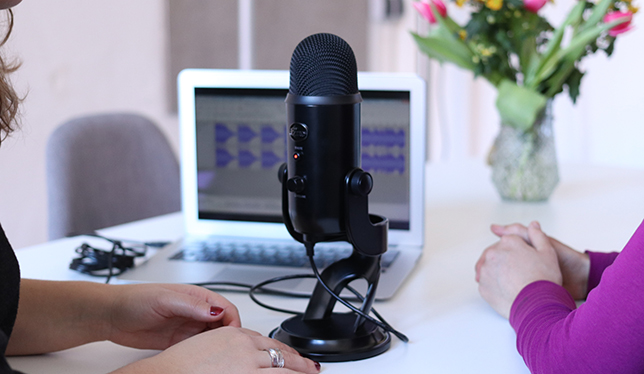A Canadian academic podcast network is reimagining the sound of scholarship
With three shows in development, the Amplify network aims to bring peer-reviewed podcasts to the public.

If it were up to Hannah McGregor, the tenure and promotion process at universities would catch up with the times. Across Canada academics are sharing their research with broader audiences in more accessible ways that challenge traditional modes of academic publishing and scholarship.
“We see universities all over the place saying, ‘we value community engagement, we value publicly oriented scholarship,’ but at the end of the day, does that show up on anybody’s tenure and promotion document?” asks Dr. McGregor, assistant professor of publishing at Simon Fraser University. “Podcasting for me is one possible way to expand our sense of what scholarship counts in a way that actually lets us think meaningfully about valuing and accounting for community-engaged work.”
As a podcaster herself, Dr. McGregor sees how powerful a tool podcasting can be for academics, but also how the form is still undervalued by institutions. She and Siobhan McMenemy hope to correct this dissonance with their newly launched scholarly podcast network Amplify. “What we’re trying to do with Amplify is provide a platform for, and really support the wishes of, today’s academic cohort who not only want to produce podcasts, but want to have their work in unconventional forms of publication to count toward their professional records,” adds Ms. McMenemy, senior editor at Wilfrid Laurier University Press.
Amplify is a direct continuation of their Scholarly Podcasting in Canada project, which used Dr. McGregor’s Secret Feminist Agenda podcast as a test case to develop and define what a scholarly podcast could be, including the peer-review process involved. “I’m not sure that any of it was anticipated or it could have been anticipated … because it was new,” says Ms. McMenemy. She adds that “in keeping with the spirit of the podcast as a genre” they decided on an open peer-review process for the network – a form of peer review that is relatively new to the editor and to Canadian university presses.
Ms. McMenemy welcomed the opportunity to experiment with open peer review, a decision which was rooted in the format as well as the politics of Dr. McGregor’s show. “The public nature of the peer review was initially determined because it was very much in keeping with the spirit of podcasting, which is an open form of communication,” Ms. McMenemy reveals. “The other reason it made sense sort of more theoretically is that Hannah’s own political and theoretical approach to her podcast is very much a collaborative, open, feminist approach.”
The feedback they’ve received from reviewers over the course of Secret Feminist Agenda’s three seasons helped shape the direction of that show, and also the questions reviewers could apply to future podcasts. Ms. McMenemy and Dr. McGregor are now bringing what they’ve learned from that experience to Amplify, an effort that spans postsecondary institutions, departments and levels of technical expertise to help academics produce their own shows while also building a community of scholar-podcasters.
“One of the reasons that the project to establish Amplify is supported across institutions and with various kinds of cultural producers engaged is precisely so that we can make sure that different kinds of audiences with different kinds of access to different kinds of resources will be able to find and access these podcasts over the long term,” Ms. McMenemy notes.
The project is funded by the Social Sciences and Humanities Research Council and involves a great deal of collaboration between Wilfred Laurier University Press, Wilfrid Laurier University Library, SFU’s publishing program and Digital Humanities Innovation Lab, a Vancouver-based non-profit called The Documentary Media Society along with a handful of colleagues and co-applicants from various Canadian universities.
While Ms. McMenemy is working from the publisher’s side and focused on peer review, editorial production, design, dissemination and promotion processes, Dr. McGregor is developing metadata protocols (descriptive data which helps to define, catalogue and make information searchable) for podcasts – a tool that will ensure that the podcasts are easy to find and access over the long term.
Amplify is currently developing three new podcasts with academics and podcasters Daniel Heath Justice (University of British Columbia), Brenna Clarke Gray (Thompson Rivers University), Kendra Cowley and María Alvarez Malvido (University of Alberta), along with assistance from supervising producer and project manager Stacey Copeland (SFU). Ms. McMenemy expects the peer-review process for these new podcasts to begin within the next year, with the podcasts to premiere sometime following the review.
“A through line in all of the [network’s] podcasts is that they’re really challenging who we think of as experts and what knowledge we think of as ‘expert knowledge’ or ‘scholarly knowledge,’” Dr. McGregor explains. Dr. Justice’s podcast will look at the ways people think about and articulate their relationships with the world of living things, drawing on knowledge not just from scientists and historians, but trappers and Indigenous sovereignty advocates; Dr. Gray’s will focus on the theory and practice of post-secondary pedagogy; while the series by Ms. Cowley and Ms. Malvido takes an interest in communication studies, specifically how radical forms of collective resistance involves moving information across borders through activists, librarians or community radio.
Dr. McGregor explains that with these shows, Amplify aims to expand the definition of subject authority and create a new audience for such expertise outside of academia. “When we challenge the norms around what is an expert voice and what counts as scholarly knowledge,” she says, “we also open up the space for dialogue with communities and publics who might not have thought of themselves as the audiences for scholarship, or who have been deliberately excluded via the way that we sort of produce and publish scholarship.”
Featured Jobs
- Business – Lecturer or Assistant Professor, 2-year term (Strategic Management) McMaster University
- Psychology - Assistant Professor (Speech-Language Pathology)University of Victoria
- Canada Excellence Research Chair in Computational Social Science, AI, and Democracy (Associate or Full Professor)McGill University
- Veterinary Medicine - Faculty Position (Large Animal Internal Medicine) University of Saskatchewan
- Canada Excellence Research Chair in Forest Biodiversity Conservation (Full Professor)University of New Brunswick













Post a comment
University Affairs moderates all comments according to the following guidelines. If approved, comments generally appear within one business day. We may republish particularly insightful remarks in our print edition or elsewhere.